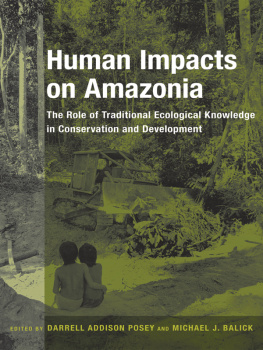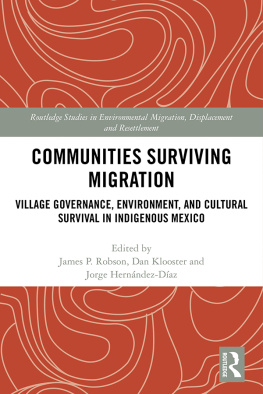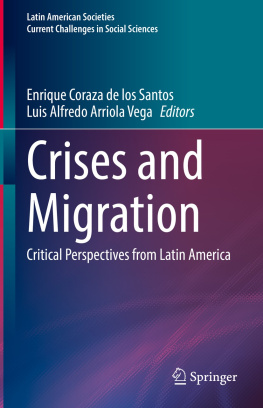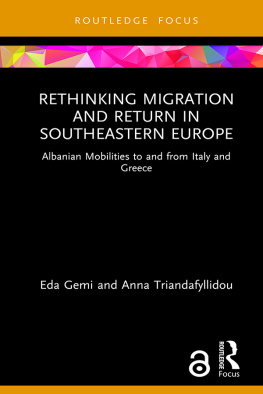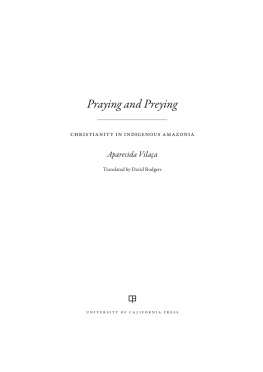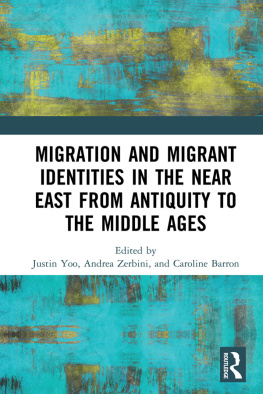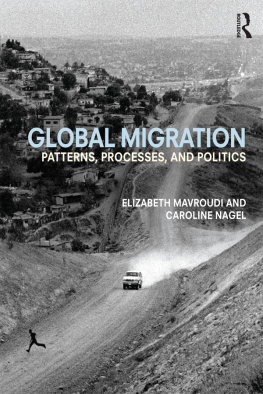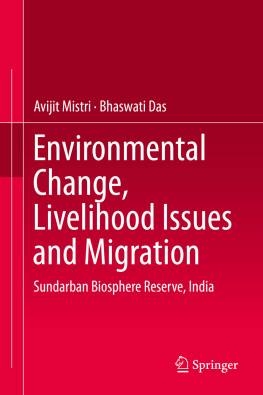Published in 2009 by
Berghahn Books
www.berghahnbooks.com
2009, 2013 Miguel N. Alexiades
First paperback edition published in 2013
All rights reserved. Except for the quotation of short passages for the purposes of criticism and review, no part of this book may be reproduced in any form or by any means, electronic or mechanical, including photocopying, recording, or any information storage and retrieval system now known or to be invented, without written permission of the publisher.
Library of Congress Cataloging-in-Publication Data
Mobility and migration in indigenous Amazonia : contemporary ethnoecological perspectives / edited by Miguel N. Alexiades.
p. cm. -- (Studies in environmental anthropology and ethnobiology ; v. 11)
Includes bibliographical references and index.
ISBN 978-1-84545-563-7 (hbk.)--ISBN 978-0-85745-797-4 (pbk.)
1. Indians of South America--Amazon River Region--Migrations. 2. Migration, Internal--Amazon River Region. 3. Indians of South America--Amazon River Region--Ethnobotany. 4. Human geography--Amazon River Region. 5. Human ecology--Amazon River Region. 6. Biodiversity--Amazon River Region. I. Alexiades, Miguel N., 1962-
F2519.3.M48M63 2009
307.2089980811--dc22
2008052518
British Library Cataloguing in Publication Data
A catalogue record for this book is available from the British Library
Printed in the United States on acid-free paper.
ISBN: 978-0-85745-797-4 (paperback) ISBN: 978-0-85745-830-8 (retail ebook)
Dedicated to the memory of Darrell A. Posey
List of Contributors
Miguel N. Alexiades, Senior Lexturer in Ethnobotany and Environmental Anthropology at the School of Anthropology and Conservation, University of Kent, Canterbury, Kent CT2 7NR, United Kingdom.
Simone Ferreira de Athayde, Postdoctoral Research Associate, Tropical Conservation and Development Program, Center for Latin American Studies, 381 Grinter Hall, PO Box 115530 Gainesville, FL 32611-5530, USA.
Charles R. Clement, Senior Researcher, Instituto Nacional de Pesquisas da Amaznia, Av. Andr Arajo, 2936 Aleixo, 69060-001 Manaus, Amazonas, Brazil.
David M. Cole, PhD candidate, Botany Department, University of Hawai'i, PO Box 2374, Kea'au, HI 96749, USA.
Meredith Dudley, Adjunct Assistant Professor at the Payson Center for International Development, Tulane University, 6823 St. Charles Avenue, New Orleans, LA 70118, USA.
Conrad Feather, Project Officer, Forest Peoples Programme, 1C Fosseway Business Park, Moreton-in-Marsh, GL56 9 NQ, England, United Kingdom.
Aturi Kaiabi, Indigenous teacher and chief of Tuiarar village at Xingu Indigenous Park Tuiarar Village/Associao Terra Indigena Xingu ATIX, Av. Mato Grosso, 607. 78640-000, Canarana, Mato Grosso, Brazil.
Giovanna Micarelli, Research Associate, Department of Anthropology, University of Illinois at Urbana-Champaign, 607 South Matthews Avenue, Urbana, IL 61801, USA. Consultant, Fundacin Eutopia, Bogot, Colombia.
Helen Newing, Lecturer, Durrell Institute of Conservation and Ecology, Department of Anthropology, Marlowe Building, University of Kent, Canterbury, Kent CT2 7NR, United Kingdom.
Katia Yukari Ono, Practitioner and ecologist, Xingu Program, Instituto Socioambiental (ISA), Av. Higienpolis no 901, sl 30, So Paulo, SP 01238-001, Brazil.
Christine Padoch, Matthew Calbraith Perry Curator of Economic Botany, Institute of Economic Botany, New York Botanical Garden, Bronx, NY 10458-5126, USA.
Daniela M. Peluso, Lecturer, Department of Anthropology, Marlowe Building, University of Kent, Canterbury, Kent CT2 7NR, United Kingdom.
Miguel Pinedo-Vasquez, Associate Research Scientist and Lecturer, Center for Environmental Research and Conservation, Columbia University, Schermerhorn Extension, 10th Floor, Columbia University, 1200 Amsterdam Avenue, New York, NY 10027, USA.
Laura Rival, University Lecturer, Institute of Social and Cultural Anthropology and Department of International Development, University of Oxford, 3 Mansfield Rd, Oxford OX1 4BT, United Kingdom.
Robert Voeks, Professor of Geography, Department of Geography, California State University, Fullerton, CA 92834, USA.
Stanford Zent, Investigador Asociado Titular, Centro de Antropologa, Instituto Venezolano de Investigaciones Cientficas (IVIC), Apartado 21827, Caracas 1020-A, Venezuela.
Editor's Preface
MIGUEL N. ALEXIADES
This book focuses on the relationship between mobility and migration and humanenvironment relations in indigenous and folk Amazonia. Most of the chapters are revised versions of papers presented at the International Society of Ethnobiology's Ninth International Congress, held at the University of Canterbury, Kent, UK, in June 2004. The motivation for putting together the panel named The Ethnobiology of Mobility, Displacement and Migration in Indigenous Lowland South America and subsequently for compiling this volume grew out of several interests and concerns. The first of these, echoing the broader theme of the Congress Ethnobiology, Social Change and Displacement recognises mobility and migration as highly relevant, both theoretically and in more applied contexts, for all of us interested in a better understanding of how human societies perceive, experience and structure their symbolic and material interactions with the environment in an increasingly articulated, changing and contingent world.
A second, more specific, motivation for collating these papers emerged from a personal sense that a disjuncture of sorts exists within the field of ethnobiology and ethnoecology in Amazonia and perhaps beyond. While human ecologists, ethnobotanists and Amazonianists in related fields have become increasingly sensitive to, and interested in, the historical contingency of nature and of humanenvironment interactions, and while there has been a simultaneous, generalised and growing interest in the processual aspects of ethnoecology, there remains a strong residual tendency, often implicit, to view these largely as the product of long-term historical emplacement and spatial stasis. Even when spatial stasis is not assumed, it is still not given the same level of attention as other historical processes.


